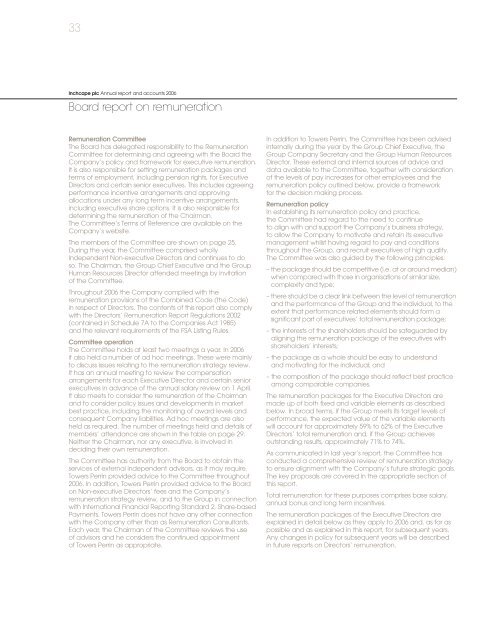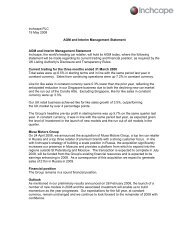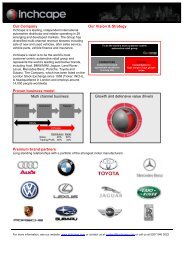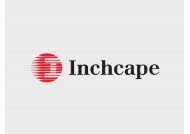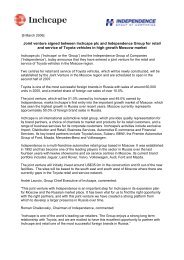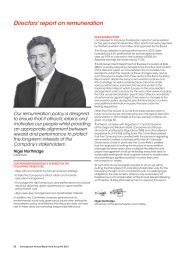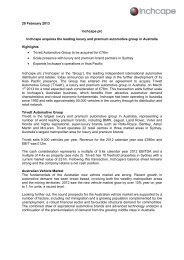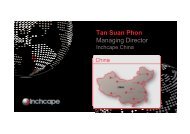32<strong>Inchcape</strong> plc Annual report and accounts 2006Corporate governance report continuedOperating unit controlsThe overall control framework for the Group is detailed inthe Group Finance and Information Systems manuals and issupplemented by risk management policies. Compliancewith Group policies and the effectiveness of internal controlsare regularly assessed through the audit process and througha process of self certification, which requires business unitmanagement to assess annually the quality of internal controlsin their businesses.Risk managementThe Group’s management operates a risk managementprocess, which identifies the key risks facing each business unit.A risk register, which identifies the key risks, the impact shouldthey occur and actions being taken to manage those risks tothe desired level, is produced for each business unit. Inaddition, actions to be taken in the event that such riskscrystallise and proposed improvements to the way they aremanaged are also included. This information is passed up theorganisation, culminating in the production of a Group RiskRegister, which is approved by the Risk Management StrategyGroup and the Executive Committee. In addition, it is providedto and discussed with the Audit Committee. Internal auditcontinuously review financial, commercial and systemsdevelopments in the Group’s business units to ensureappropriate audit focus in the major risk areas.Investment appraisalThe Group has clearly defined policies for capital expenditure.These include annual budgets and detailed appraisal andreview procedures.The Board has reviewed the effectiveness of internal controlsystems in operation during the financial year in accordancewith the guidance set out in the Turnbull Report, throughthe processes set out above. As part of the process that theCompany has in place to review the effectiveness of theinternal control system, there are procedures designed tocapture and evaluate failings and weaknesses, and in thecase of those categorised by the Board as’significant’,procedures exist to ensure that necessary remedial actionis takenAuditors’ independenceThe Company has an established policy on the provision ofnon-audit services by the external auditors. Through its AuditCommittee, the Company has reviewed a report from itsauditors, PricewaterhouseCoopers LLP (PwC), confirming, intheir professional judgement, their independence. The reviewincluded the audit, audit related, tax and advisory servicesprovided by PwC, and compliance with the Group policywhich prescribes the types of engagements for which externalauditors may be used. The Committee also noted that theaudit partner is subject to a five year fixed term rotationwhich has been applied. Having regard to the policy on theengagement of external auditors for non-audit services, andthe report from the auditors, the Company concluded thatthere are sufficient controls and processes in place to ensurethe continued level of independence.Statement of compliance with the Combined CodeThe Company was in compliance with the Code throughoutthe year ended 31 December 2006.Directors’ responsibilitiesThe Directors are responsible for preparing the Annualreport, the Directors’ Remuneration Report and theFinancial statements in accordance with applicable lawand regulations.Company law requires the Directors to prepare Financialstatements for each financial year. Under that law the Directorshave prepared the Group Financial statements in accordancewith International Financial Reporting Standards (IFRSs) asadopted by the European Union, and the parent companyFinancial statements and the Directors’ Remuneration Reportin accordance with applicable law and United KingdomAccounting Standards (United Kingdom Generally AcceptedAccounting Practice). The Group and parent companyfinancial statements are required by law to give a true and fairview of the state of affairs of the Company and the Group andthe profit or loss of the Group for that period.In preparing those Financial statements, the Directors arerequired to:– select suitable accounting policies and then applythem consistently;– make judgements and estimates that are reasonableand prudent;– state that the Group Financial statements comply with IFRSsas adopted by the European Union and with regard to theCompany financial statements that, applicable UKAccounting Standards have been followed, subject toany material departures disclosed and explained in thefinancial statements– prepare the Group and Company Financial statements onthe going concern basis, unless it is inappropriate to presumethat the Company and the Group will continue in business,in which case there should be supporting assumptions orqualifications as necessary.The Directors confirm that they have complied with the aboverequirements in preparing the Financial statements.The Directors are responsible for keeping proper accountingrecords, which disclose with reasonable accuracy at any timethe financial position of the Company and the Group andenable them to ensure that the Group Financial statementscomply with the Companies Act 1985 and Article 4 of the IASRegulation and the Company financial statements and theDirectors’ Remuneration Report comply with the CompaniesAct 1985. They are also responsible for safeguarding theassets of the Company and the Group, and hence for takingreasonable steps for the prevention and detection of fraudand other irregularities. The Directors are responsible forthe maintenance and integrity of the Company’s website.The work carried out by the auditors does not involveconsideration of these matters, and accordingly the auditorsaccept no responsibility for any changes that may haveoccurred to the Financial statements since they were initiallypresented on the website. Information published on theinternet is accessible in many countries with different legalrequirements. Legislation in the UK governing the preparationand dissemination of financial statements may differ fromlegislation in other jurisdictions.
33<strong>Inchcape</strong> plc Annual report and accounts 2006Board report on remunerationRemuneration CommitteeThe Board has delegated responsibility to the RemunerationCommittee for determining and agreeing with the Board theCompany’s policy and framework for executive remuneration.It is also responsible for setting remuneration packages andterms of employment, including pension rights, for ExecutiveDirectors and certain senior executives. This includes agreeingperformance incentive arrangements and approvingallocations under any long term incentive arrangements,including executive share options. It is also responsible fordetermining the remuneration of the Chairman.The Committee’s Terms of Reference are available on theCompany’s website.The members of the Committee are shown on page 25.During the year, the Committee comprised whollyIndependent Non-executive Directors and continues to doso. The Chairman, the Group Chief Executive and the GroupHuman Resources Director attended meetings by invitationof the Committee.Throughout 2006 the Company complied with theremuneration provisions of the Combined Code (the Code)in respect of Directors. The contents of this report also complywith the Directors’ Remuneration Report Regulations 2002(contained in Schedule 7A to the Companies Act 1985)and the relevant requirements of the FSA Listing Rules.Committee operationThe Committee holds at least two meetings a year. In 2006it also held a number of ad hoc meetings. These were mainlyto discuss issues relating to the remuneration strategy review.It has an annual meeting to review the compensationarrangements for each Executive Director and certain seniorexecutives in advance of the annual salary review on 1 April.It also meets to consider the remuneration of the Chairmanand to consider policy issues and developments in marketbest practice, including the monitoring of award levels andconsequent Company liabilities. Ad hoc meetings are alsoheld as required. The number of meetings held and details ofmembers’ attendance are shown in the table on page 29.Neither the Chairman, nor any executive, is involved indeciding their own remuneration.The Committee has authority from the Board to obtain theservices of external independent advisors, as it may require.Towers Perrin provided advice to the Committee throughout2006. In addition, Towers Perrin provided advice to the Boardon Non-executive Directors’ fees and the Company’sremuneration strategy review, and to the Group in connectionwith International Financial Reporting Standard 2, Share-basedPayments. Towers Perrin does not have any other connectionwith the Company other than as Remuneration Consultants.Each year, the Chairman of the Committee reviews the useof advisors and he considers the continued appointmentof Towers Perrin as appropriate.In addition to Towers Perrin, the Committee has been advisedinternally during the year by the Group Chief Executive, theGroup Company Secretary and the Group Human ResourcesDirector. These external and internal sources of advice anddata available to the Committee, together with considerationof the levels of pay increases for other employees and theremuneration policy outlined below, provide a frameworkfor the decision making process.Remuneration policyIn establishing its remuneration policy and practice,the Committee had regard to the need to continueto align with and support the Company’s business strategy,to allow the Company to motivate and retain its executivemanagement whilst having regard to pay and conditionsthroughout the Group, and recruit executives of high quality.The Committee was also guided by the following principles:– the package should be competitive (i.e. at or around median)when compared with those in organisations of similar size,complexity and type;– there should be a clear link between the level of remunerationand the performance of the Group and the individual, to theextent that performance related elements should form asignificant part of executives’ total remuneration package;– the interests of the shareholders should be safeguarded byaligning the remuneration package of the executives withshareholders’ interests;– the package as a whole should be easy to understandand motivating for the individual; and– the composition of the package should reflect best practiceamong comparable companies.The remuneration packages for the Executive Directors aremade up of both fixed and variable elements as describedbelow. In broad terms, if the Group meets its target levels ofperformance, the expected value of the variable elementswill account for approximately 59% to 62% of the ExecutiveDirectors’ total remuneration and, if the Group achievesoutstanding results, approximately 71% to 74%.As communicated in last year’s report, the Committee hasconducted a comprehensive review of remuneration strategyto ensure alignment with the Company’s future strategic goals.The key proposals are covered in the appropriate section ofthis report.Total remuneration for these purposes comprises base salary,annual bonus and long term incentives.The remuneration packages of the Executive Directors areexplained in detail below as they apply to 2006 and, as far aspossible and as explained in this report, for subsequent years.Any changes in policy for subsequent years will be describedin future reports on Directors’ remuneration.


